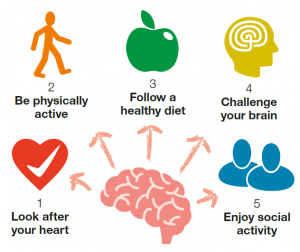
#LetsTalkAboutDementia
If you’re like most people, dementia is one of your greatest fears about aging.
By the year 2050, more than 152 million people around the world will have it, according to Alzheimer’s Disease International (ADI).
And while there is no vaccine or cure, research that suggests exercise can reduce the risk or severity of Alzheimer’s and other forms of dementia.
- “Moving your body has immediate, long-lasting and protective benefits for your brain that can last for the rest of your life,” neuroscientist Wendy Suzuki says.
- The Alzheimer’s Association says regular cardiovascular exercise can help reduce the risk. So can resistance training.
- A study published in the Journal of Neurology, Neurosurgery, & Psychiatry says physical activity can give you a 36 percent better chance of avoiding it.
September marks the ninth World Alzheimer’s Month, an international campaign to raise dementia awareness and challenge stigma. Alzheimer associations and others around the world organize advocacy, raise money, and share information.
The social media tag will be #LetsTalkAboutDementia.
5 Ways to Reduce Your Risk of Dementia
“Research suggests that leading a healthy lifestyle may help to reduce a person’s risk of developing dementia later in life,” ADI says. “The general rule is what’s good for the heart is good for the brain, so both should be well looked after with a balanced diet and regular physical and mental exercise.”
It’s never too late to make positive changes. Here are five things everyone can do, ADI says.
- Take care of your heart.
Smoking, high blood pressure, high cholesterol, diabetes and obesity all damage blood vessels and increase the risk for having a stroke or a heart attack, that could contribute to developing dementia in later life. Exercise can help improve heart health.
- Be physically active.
It controls weight and blood pressure. It lowers the risk of type 2 diabetes and some forms of cancer. And evidence shows is can reduce the risk of dementia. No matter what, though, exercise always makes us feel better!
- Eat well
A healthy diet is good for your body – and also for your brain. Studies suggest that a Mediterranean-style diet is good, with fish, legumes and vegetables. And we definitely know what’s bad for us: processed foods with sugar, salt and saturated fat.
- Keep Working Your Brain
Learn a language, start a new hobby, or play music. New challenges strengthen build new brain neurons and strengthen the connections between them.
- Socialize
Social activity is good for our brain health. It stimulates our brain reserves. So make time for family, friends, and social obligations. ADI makes an excellent suggestion to combine these activities with physical and mental exercise, sports, and hobbies.
#Let’s Talk about Dementia
The ADI says that two-thirds of people feel like their countries don’t have much understanding of Alzheimer’s and other forms of dementia.
All through the month of September, see what you can do to help people who have dementia or might be at risk. Talk to your doctor about any concerns you have. And contact me to learn what we’re doing to keep at-risk populations moving in a safe, fun environment.

Appreciating the time and effort you put into your website and in-depth information you offer. Nice explanation and you have pointed out some valid points exceptionally well. I will certainly dig it and personally suggest to my friends. I’m sure they’ll be benefited from this website. Thanks for sharing!